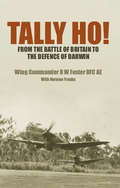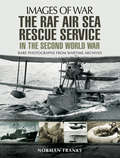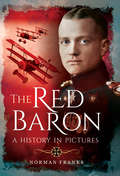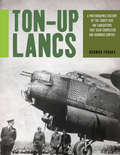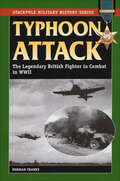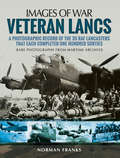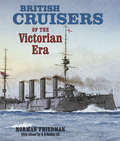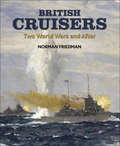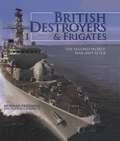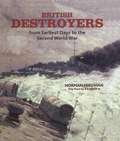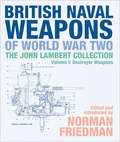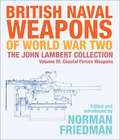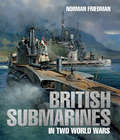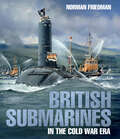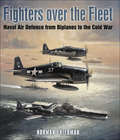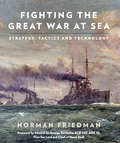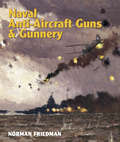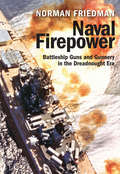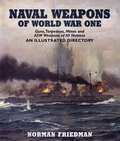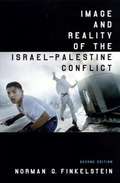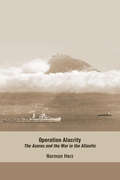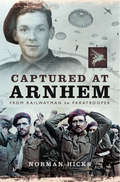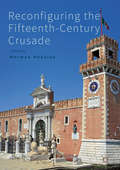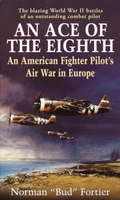- Table View
- List View
Tally Ho!: From the Battle of Britain to the Defence of Darwin
by Norman Franks R W FosterA memoir of the life and World War II service of Battle of Britain veteran, RAF fighter pilot Bob Foster. Bob Foster's flying years began shortly before WWII, when he learned to fly with the RAFVR. Called up for war service in September 1939, he completed his training and was posted to 605 Squadron, equipped with Hawker Hurricanes. By early September 1940 he and his Squadron were in the thick of the air fighting over southern England, operating from Croydon. Surviving the Battle, he later became an instructor, but shortly after joining 54 Squadron, which had Spitfires, he and his unit were sent to Australia to defend the Darwin area from Japanese incursions. Awarded the DFC for his efforts, he returned to the UK and was given an assignment with a RAF public relations outfit, ending up in Normandy within three weeks of the invasion of 1944. Often serving right up in the front lines, Bob saw the war at very close hand, and then quite by chance became one of the first, if not the first, RAF officer to enter Paris with the liberating French army, and again, by chance, was in General de Gaulle's triumphant procession down the Champs-Élysées. His memoir is an entertaining collection of stories and reminiscences of two distinct areas of WWII, which also shows how luck often shaped the lives of the fighter pilots involved. Bob Foster later became a successful sales manager with Shell-Mex and BP, as well as serving with the Royal Auxiliary Air Force. He now lives with his wife Kaethe near Bexhill in East Sussex.
The RAF Air-Sea Rescue Service in the Second World War (Images of War)
by Norman FranksWhen the Second World War began in 1939 it was thought that it would be fought along the same lines as the First World War, with the Allied air forces operating from both Britain and France. With the fall of Britains Northern European Allies in May 1940, all that changed. From then onwards, RAF aircraft operating over enemy and enemy-held territory necessitated flights across both the North Sea and the English Channel.This meant that aircrew in difficulties would be forced to come down in both of these bodies of water. Therefore it was essential that some form of rescue service be made available to fish these airman from the water. But there were no aircraft in existence at that time that were designed for such a task: initially all that could be done was to use land planes to help locate anyone in the water, drop a dinghy to them, and then guide a boat to their position.Obviously a quicker and more reliable means of rescue was needed, and this came in the shape of the Supermarine Walrus, an amphibian airplane that could land on both sea and land. Several Flights of these airplanes were set up around the coast of Britain, concentrated mainly around the south and southeast of England. The Air Sea Rescue airmen did a magnificent job from 1941-45, rescuing hundreds of downed RAF and USAAF aircrew. It took a special type of airman to undertake these rescues and another kind of courage.As the war in North Africa developed, Walrus aircraft were needed in the Mediterranean, and later on either side of the Italian coast. Walrus squadrons operated just as successfully in this theater as around Britain. Aircrew operating over any stretch of water could always count on the ASR boys coming to their aid. This is their story.
The Red Baron: A History in Pictures
by Norman FranksA pictorial history of the infamous German World War I air force pilot, by the author of Dieppe: The Greatest Air Battle. There are numerous books covering the life of Rittmeister Manfred Freiherr von Richthofen, and he has remained at the forefront of World War I studies. In commemoration of one hundred years since the beginning of the war, author Norman Franks introduces a new collection of photographs covering the entire span of von Richthofen&’s war (most of which will have been seen but spread over a variety of literature about First World War flying), consolidated in one book. In the time since the release of Franks earlier titles on a similar theme, a constant trickle of new information has filtered down to him. Although none of it specifically challenges the conclusions drawn in earlier publications, in consolidating them here, he&’s been able to preserve some significant notes of interest. Following several visits to Belgium and Northern France, Franks has managed to acquire additional images, illustrating the places in which the Red Baron lived and fought between 1916 and 1918. This collection covers the entire span of von Richthofen&’s recorded history in pictures, some new and lesser known, some iconic and widely circulated, and all housed here under one roof for the very first time.&“If you are a Red Baron fan, this book is a must-have. Even if you are new to the topic, the text provides an excellent introduction to his career.&” —The Miniatures Page&“In summation, The Red Baron: A History in Pictures is recommended.&” —Over the Front
Ton-Up Lancs: A Photographic History of the Thirty-Five RAF Lancasters that Each Completed One Hundred Sorties
by Norman FranksAn updated and expanded photographic history of the famed military aircraft—and the men who flew them. Aviation historian Norman Franks updates his classic book, The Lancaster, with new information and photos. The Avro Lancaster was a four-engine heavy bomber that played a crucial role in World War II, and this illustrated volume records the history of thirty-five of them, supported by stories from aircrew members. The most famous of the bombers is &“Queenie&” (W5868), the only one of these Lancasters that survives, now in the Bomber Command Hall at the Royal Air Force Museum in London. Ton-Up Lancs delves into some of the controversies surrounding Queenie and other Lancasters, and also includes detailed listings of each raid these thirty-five Lancasters flew during from 1942 through 1945, together with the names of the pilot and crew that took them on sorties all over Hitler&’s Third Reich and Northern Italy, on support missions before and after D-Day in June 1944, and attacks on V1 rocket launch sites situated in Northern France. The book also offers a view from one of the Lancaster&’s former skippers on what it was like to fly a bomber tour of operations in Bomber Command.
Typhoon Attack: The Legendary British Fighter in Combat in WWII (Stackpole Military History Series)
by Norman FranksThis volume collects lively tales of aerial combat from Royal Air Force pilots who flew Typhoon fighters into the frontlines of WWII. The Typhoon fighter played a pivotal role in Allied victories from D-Day to the Battle of the Bulge and the final battle in Germany. Through original interviews with RAF veterans, Norman Franks explores what it was really like to fly Britain&’s legendary, rocket-firing fighters. Typhoon Attack shares stories of flying over Holland or France at low level, seeking out hostile aircraft or targets on the ground; rolling over at twelve-thousand feet, then upside down; attacking trains, ships, flak posts, tanks, and more; not to mention the mind-numbing experience of crash-landing a shot-up Tiffy.
Veteran Lancs: A Photographic Record of the 35 RAF Lancasters that Each Completed One Hundred Sorties
by Norman FranksAviation historians will know that the Avro Lancaster bomber is the most famous aircraft to have fought with RAF Bomber Command during World War Two. They will know too that, of the 7,366 that were built, over 3,400 were lost on operations and a further 200 plus were destroyed and written-off in crashes. Operational sorties flown totalled more than 156,000, carrying over 600,000 tons of bombs to targets all over Europe. But this came at a terrible cost. With extensive losses on some night operations, occurring when bombers were pitted against a dedicated German night-fighter arm (as well as anti-aircraft fire) it is not surprising, or even incredible, that just 35 Lancasters managed to complete 100 or more sorties during the course of the war. A number of them actually achieved well over one hundred sorties, and a few were tragically lost after reaching this amazing figure.This book covers the history of these 35 incredible Lancasters, featuring many photographs of both aircraft and crew members drawn together in an effort to create a photographic record of these veterans. In addition, there is a section dedicated to many Lancasters that, whilst not achieving this almost magic total, either through eventual loss or the ending of the war, did achieve a large number of operations. Pictures of these have been added so that their achievements, as well as the achievements of the crews who flew in them, can be viewed together.
British Cruisers of the Victorian Era
by Norman FriedmanGradually evolving from the masted steam frigates of the mid-nineteenth century, the first modern cruiser is not easy to define, but for the sake of this book the starting point is taken to be Iris and Mercury of 1875. They were the RN's first steel-built warships; were designed primarily to be steamed rather than sailed; and formed the basis of a line of succeeding cruiser classes. The story ends with the last armoured cruisers, which were succeeded by the first battlecruisers (originally called armoured cruisers), and with the last Third Class Cruisers (Topaze class), all conceived before 1906. Coverage, therefore, dovetails precisely with Friedman's previous book on British cruisers, although this one also includes the wartime experience of the earlier ships.rn The two central themes are cruisers for the fleet and cruisers for overseas operations, including (but not limited to) trade protection. The distant-waters aspect covers the belted cruisers, which were nearly capital ships, intended to deal with foreign second-class battleships in the Far East. The main enemies contemplated during this period were France and Russia, and the book includes British assessments of their strength and intentions, with judgements as to how accurate those assessments were.rn As would be expected of Friedman, the book is deeply researched, original in its analysis, and full of striking insights another major contribution to the history of British warships.
British Cruisers: Two World Wars and After
by Norman Friedman&“An extraordinarily detailed account of the development of Royal Navy cruisers . . . a towering work&” from the author of Fighting the Great War at Sea (Warship 2012). For most of the twentieth century, Britain possessed both the world&’s largest merchant fleet and its most extensive overseas territories. It is not surprising, therefore, that the Royal Navy always showed a particular interest in the cruiser—a multipurpose warship needed in large numbers to defend trade routes and police the empire. Above all other types, the cruiser&’s competing demands of quality and quantity placed a heavy burden on designers, and for most of the interwar period, Britain sought to square this circle through international treaties restricting both size and numbers. In the process, she virtually invented the heavy cruiser and inspired the large 6in-armed cruiser, neither of which, ironically, served her best interests. This book seeks to comprehend, for the first time, the full policy background—from which a different and entirely original picture of British cruiser development emerges. After the war, the cruiser&’s role was reconsidered, and the final chapters of the book cover modernizations, the plans for missile-armed ships, and the convoluted process that turned the &“through-deck cruiser&” into the Invincible class light carriers. With detailed appendices of ship data, and illustrated in depth with photos and A.D. Baker&’s specially commissioned plans, British Cruisers truly matches the lofty standards set by Friedman&’s previous books on British destroyers. &“Wow! . . . Lavishly illustrated with a photograph or line plan on almost every page. The text is packed with technical information, detail, and description of design, construction and application of these important ships.&” —Clash of Steel
British Destroyers & Frigates: The Second World War & After
by Norman Friedman&“A comprehensive survey of the design history and development of the Royal Navy's greyhounds of the sea.&”—WARSHIPS Magazine Since World War II, the old categories of destroyer and frigate have tended to merge, a process that this book traces back to the radically different &“Tribal&” class destroyers of 1936. It deals with the development of all the modern destroyer classes that fought the war, looks at the emergency programs that produced vast numbers of trade protection vessels—sloops, corvettes and frigates—then analyzes the pressures that shaped the post-war fleet, and continued to dominate design down to recent years. Written by America's leading authority and featuring photos and ship plans, it is an objective but sympathetic view of the difficult economic and political environment in which British designers had to work, and benefits from the author's ability to compare and contrast the US Navy's experience. Norman Friedman is renowned for his ability to explain the policy and strategy changes that drive design decisions, and his latest book uses previously unpublished material to draw a new and convincing picture of British naval policy over the previous seventy years and more. Includes photos
British Destroyers: From Earliest Days to the Second World War
by Norman FriedmanA history of the early days of Royal Navy destroyers, and how they evolved to meet new military threats. In the late nineteenth century the advent of the modern torpedo woke the Royal Navy to a potent threat to its domination, not seriously challenged since Trafalgar. For the first time a relatively cheap weapon had the potential to sink the largest, and costliest, exponents of sea power. Not surprisingly, Britain&’s traditional rivals invested heavily in the new technology that promised to overthrow the naval status quo. The Royal Navy was also quick to adopt the new weapon, but the British concentrated on developing counters to the essentially offensive tactics associated with torpedo-carrying small craft. From these efforts came torpedo catchers, torpedo-gunboats and eventually the torpedo-boat destroyer, a type so successful that it eclipsed and then usurped the torpedo-boat itself. With its title shortened to destroyer, the type evolved rapidly and was soon in service in many navies, but in none was the evolution as rapid or as radical as in the Royal Navy. This book is the first detailed study of their early days, combining technical history with an appreciation of the changing role of destroyers and the tactics of their deployment. Like all of Norman Friedman&’s books, it reveals the rationale and not just the process of important technological developments.
British Naval Weapons of World War Two, Volume I: Destroyer Weapons (The John Lambert Collection)
by Norman Friedman&“For anyone wishing to super-detail any British destroyer of this era, this book looks to be a real must-have.&” —Nautical Research Guild's Model Ship World John Lambert was a renowned naval draftsman, whose plans were highly valued for their accuracy and detail by modelmakers and enthusiasts. By the time of his death in 2016 he&’d produced over 850 sheets of drawings, many of which have never been published—until now. Lambert&’s interest was always focused on smaller warships and his weapons drawings tend to be of open mountings—the kind that present a real challenge to modelmakers—rather than enclosed turret guns, but he also produced drawings of torpedo tubes, underwater weapons, fire-control directors, and even some specific armament-related deck fittings. This first volume in a series covers all such weapons carried by British destroyers of this era, with additional appendices devoted to earlier guns still in service, and destroyer-caliber weapons only mounted in larger ships. The drawings are backed by introductory essays by Norman Friedman, an acknowledged authority on naval ordnance, while a selection of photographs add to the value of the book as visual reference.
British Naval Weapons of World War Two, Volume III: Coastal Forces Weapons (The John Lambert Collection #3)
by Norman Friedman“Lambert was a drafter of no mean skill . . . his drawings are concise, clear, and invaluable to scratchbuilders and super-detailers. Very highly recommended!” —Nautical Research JournalJohn Lambert was a renowned naval draftsman whose plans were highly valued for their accuracy and detail by modelmakers and enthusiasts. By the time of his death in 2016 he had produced over 850 sheets of drawings, many of which had never been published. Now they have become available in these remarkable collections, with expert commentary and captioning included. The initial volumes concentrate on British naval weaponry used in the Second World War, thus completing the project Lambert was working on when he died. His interest was always focused on smaller warships and his weapons drawings tend to be of open mountings—the kind that present a real challenge to modelmakers—rather than enclosed turret guns, but he also produced drawings of torpedo tubes, underwater weapons, fire-control directors, and even some specific armament-related deck fittings. Following the earlier volumes on destroyer and escort armament, this one covers the multitude of weapons carried by Coastal Forces, many of which were improvised, ad hoc, or obsolescent, but eventually led to powerful purpose-designed weaponry. An appendix covering the main deck guns carried by British submarines of this era is included, along with an introductory essay by naval ordnance authority Norman Friedman and a selection of photos.
British Submarines in Two World Wars
by Norman FriedmanAn &“indispensable&” guide to the Royal Navy&’s submarines through 1945, with numerous photos and original plans (The Naval Review). The Royal Navy didn&’t invent the submarine—but in 1914, Britain had the largest submarine fleet in the world, and at the end of World War I it had some of the largest and most unusual of all submarines—whose origins and designs are all detailed in this book. During the First World War they virtually closed the Baltic to German iron ore traffic, and blocked supplies to the Turkish army at Gallipoli. They were a major element in the North Sea battles, and fought the U-boat menace. During World War II, US submarines were known for strangling Japan, but lesser known is the parallel battle by British submarines in the Mediterranean to strangle the German army in North Africa. Like their US counterparts, interwar British submarines were designed largely with the demands of a possible Pacific War, though that was not the war they fought. The author also shows how the demands of such a war, fought over vast distances, collided with interwar British Government attempts to limit costs. It says much about the ingenuity of British submarine designers that they met their requirements despite enormous pressure. The author shows how evolving strategic and tactical requirements and evolving technology produced successive types of design. British submariners contributed much to the development of anti-submarine tactics and technology, beginning with largely unknown efforts before World War I. Between the wars, they exploited the new technology of sonar (Asdic), and as a result pioneered submarine silencing, with important advantages to the US Navy as it observed the British. They also pioneered the vital postwar use of submarines as anti-submarine weapons, sinking a U-boat while both were submerged. Heavily illustrated with photos and original plans and incorporating much original analysis, this book is ideal for naval historians and enthusiasts. &“Sure to become the standard reference for British submarine development for years to come&” —Warship
British Submarines in the Cold War Era
by Norman FriedmanThe first comprehensive technical history on the subject, with photos: &“A must-read for all professionals, designers and scholars of modern submarines.&” —Australian Naval Institute The Royal Navy&’s greatest contribution to the Allied success in World War II was undoubtedly the defeat of the U-boat menace in the North Atlantic, a victory on which all other European campaigns depended. The underwater threat was the most serious naval challenge of the war, so it was not surprising that captured German submarine technology became the focus of attention for the British submarine service after 1945. It was quick to test and adopt the schnorkel, streamlining, homing torpedoes, and, less successfully, hydrogen-peroxide propulsion. Furthermore, in the course of the long Atlantic battle, the Royal Navy had become the world&’s most effective anti-submarine force and was able to utilize this expertise to improve the efficiency of its own submarines. However, in 1945 German submarine technology had also fallen into the hands of the Soviet Union—and as the Cold War developed it became clear that a growing Russian submarine fleet would pose a new threat. Britain had to go to the US for its first nuclear propulsion technology, but the Royal Navy introduced the silencing technique that made British and US nuclear submarines viable anti-submarine assets, and it pioneered in the use of passive—silent—sonars in that role. Nuclear power also changed the role of some British submarines, which replaced bombers as the core element of British Cold War and post-Cold War nuclear deterrence. As in other books in this series, this one shows how a combination of evolving strategic and tactical requirements and new technology produced successive types of submarines. It is based largely on unpublished and previously classified official documentation, and to the extent allowed by security restrictions, also tells the operational story—HMS Conqueror is still the only nuclear submarine to have sunk a warship in combat, but there are many lesser-known aspects of British submarine operations in the postwar era.
Fighters Over the Fleet: Naval Air Defence from Biplanes to the Cold War
by Norman FriedmanA tactical and technical history of the development of British, American, and Japanese naval air defense from the 1920s to the 1980s. This is an account of the evolution of naval fighters for fleet air defense and the parallel evolution of the ships operating and controlling them, concentrating on the three main exponents of carrier warfare: the British Royal Navy, the U.S. Navy, and the Imperial Japanese Navy. It describes the earliest efforts from the 1920s, but it was not until radar allowed the direction of fighters that organized air defense became possible. Thus, major naval-air battles of the Second World War like Midway, the Pedestal convoy, the Philippine Sea, and Okinawa are portrayed as tests of the new technology. This was ultimately found wanting by the Kamikaze campaigns, leading to postwar moves towards computer control and new kinds of fighters. After 1945 the threats of nuclear weapons and standoff missiles compounded the difficulties of naval air defense. The second half of the book covers R.N. and U.S.N. attempts to solve these problems, looking at the American experience in Vietnam and British operations in the Falklands War. It concludes with the ultimate U.S. development of techniques and technology to fight the Outer Air Battle in the 1980s, which in turn point to the current state of carrier fighters and the supporting technology. Based largely on documentary sources, some previously unused, this book will appeal to both the naval and aviation communities.&“Fighters Over the Fleet provides more information about fleet air defense than any other work currently available. It is recommended for specialist as well aviation-minded readers.&” —Naval Historical Foundation
Fighting the Great War at Sea: Strategy, Tactic and Technology
by Norman FriedmanWinner of the John Lyman Book Award for Naval and Maritime Science and Technology. &“A compelling and convincing historical analysis of World War I.&” —Navy News While the overriding image of the First World War is of the bloody stalemate on the western front, the overall shape of the war arose out of its maritime character. It was essentially a struggle about access to worldwide resources, most clearly seen in Germany&’s desperate attempts to counter the American industrial threat, which ultimately drew the United States into the war. This radical new book concentrates on the way in which each side tried to use or deny the sea to the other, and in so doing, describes rapid wartime changes not only in ship and weapons technology but also in the way naval warfare was envisaged and fought. Melding strategic, technical, and tactical aspects, Friedman approaches the First World War from a fresh perspective and demonstrates how its perceived lessons dominated the way navies prepared for the Second World War. &“Friedman is a master of the evolution of naval strategy, tactics and technology . . . a rewarding read that will leave many wanting to return again and again just to see what they might have missed the first time.&” —Australian Naval Institute &“Dr. Friedman&’s research credentials are impeccable, and the huge amount of factual detail he has unearthed will be sure to delight many . . . there is nothing comparable in either depth or scope out there, and for this reason, if no other, this book is likely to become a standard work on the naval aspects of the Great War.&” —Naval War College Review
Naval Anti-Aircraft Guns and Gunnery
by Norman FriedmanThis book does for naval anti-aircraft defence what the author's Naval Firepower did for surface gunnery it makes a highly complex but historically crucial subject accessible to the layman. It chronicles the growing aerial threat from its inception in the First World War and the response of each of the major navies down to the end of the Second, highlighting in particular the widely underestimated danger from dive-bombing. Central to this discussion is an analysis of what effective AA fire-control required, and how well each navy's systems actually worked. It also takes in the weapons themselves, how they were placed on ships, and how this reflected the tactical concepts of naval AA defence. As would be expected from any Friedman book, it offers striking insights he argues, for example, that the Royal Navy, so often criticised for lack of 'air-mindedness', was actually the most alert to the threat, but that its systems were inadequate not because they were too primitive but because they tried to achieve too much.The book summarises the experience of WW2, particularly in theatres where the aerial danger was greatest, and a concluding chapter looks at post-1945 developments that drew on wartime lessons. All important guns, directors and electronics are represented in close-up photos and drawings, and lengthy appendices detail their technical data. It is, simply, another superb contribution to naval technical history by its leading exponent.
Naval Firepower: Battleship Guns and Gunnery in the Dreadnought Era
by Norman FriedmanAn in-depth history of naval battleship firepower from before World War I to the end of World War II, by America&’s leading naval analyst. For more than half a century, the big gun was the arbiter of naval power, but it was useless if it could not hit the target fast and hard enough to prevent the enemy doing the same. Because the naval gun platform was itself in motion, finding a &“firing solution&” was a significant problem exacerbated when gun sizes increased, fighting ranges lengthened, and seemingly minor issues like wind velocity had to be considered. To speed up the process and eliminate human error, navies sought a reliable mechanical calculation. This heavily illustrated book outlines for the first time in layman&’s terms the complex subject of fire-control, as it dominated battleship and cruiser design from before World War I to the end of the dreadnought era. Covering the directors, range-finders, and electro-mechanical computers invented to solve the problems, author Norman Friedman explains not only how the technology shaped (and was shaped by) the tactics involved, but also analyzes their effectiveness in battle. His examination of the controversy surrounding Jutland and the relative merits of competing fire-control systems draws surprising conclusions. He also reassesses many other major gun actions, such as the battles between the Royal Navy and the Bismarck, and the U.S. Navy actions in the Solomons and at Surigao Strait. All major navies are covered, and the story concludes at the end of World War II with the impact of radar.
Naval Weapons of World War One: Guns, Torpedoes, Mines and ASW Weapons of All Nations (An Illustrated Directory)
by Norman FriedmanAn in-depth reference to the naval weapons used by Britain, Germany, the US, and the other combatants in the Great War, with photos: &“Superb…invaluable.&”—History of War Although the Great War might be regarded as the heyday of the big-gun at sea, it also saw the maturing of underwater weapons, the mine and torpedo, as well as the first signs of the future potency of air power. Between 1914 and 1918 weapons development was both rapid and complex, so this book has two functions: on the one hand it details all the guns, torpedoes, mines, aerial bombs and anti-submarine systems employed during that period; but it also seeks to explain the background to their evolution: how the weapons were perceived at the time and how they were actually used. This involves a discussion of tactics and emphasizes the key enabling technology of fire control and gun mountings. In this respect, the book treats the war as a transition from naval weapons which were essentially experimental at its outbreak to a state where they pointed directly to what would be used in World War II. Based largely on original research, this sophisticated book is more than a catalogue of the weapons, offering insight into some of the most important technical and operational factors influencing the war at sea.
Goldstone Recants: Richard Goldstone Renews Israel's License to Kill
by Norman G. FinkelsteinON APRIL 1 2011, in the pages of the Washington Post, the international jurist Richard Goldstone dropped a bombshell. He effectively disowned the massive evidence assembled in the United Nations' report carrying his name that Israel had committed multiple war crimes and possible crimes against humanity in Gaza during its 2008-9 invasion. Israel was jubilant. "Everything that we said proved to be true," Prime Minister Benjamin Netanyahu crowed. "We always said that the IDF [Israel Defense Forces] is a moral army that acted according to international law," Defense Minister Ehud Barak declared. "We had no doubt that the truth would come out eventually," Foreign Minister Avigdor Lieberman proclaimed. The Obama administration used the occasion of Goldstone's recantation to affirm that Israel had not "engaged in any war crimes" during the Gaza assault while the U.S. Senate unanimously called on the United Nations to "rescind" the Goldstone Report. Some commentators have endeavored to prove by parsing his words that Goldstone did not actually recant. While there are grounds for making this argument on a technical basis, such a rhetorical strategy will not wash. Goldstone is a distinguished jurist. He knows how to use precise language. If he did not want to sever his connection with the Report he could simply have said "I am not recanting my original report by which I still stand." He must have known exactly how his words would be spun and it is this fallout--not his parsed words--that we must now confront.
Image and Reality of the Israel Palestine Conflict (2nd edition)
by Norman G. FinkelsteinFirst published in 1995, this polemical study challenges generally accepted truths of the Israel-Palestine conflict as well as much of the revisionist literature. This new edition critically re-examines dominant popular and scholarly images in the light of the current failures of the peace process.
Operation Alacrity
by Norman HerzTo win the war against German U-boats, the Allies had to protect their convoys in the vast black hole of the mid-Atlantic known as the Azores Gap. In 1943 they devised a plan to set up air bases on the Azores Islands, owned by neutral Portugal. It was essential for the operation to remain secret because the Allies had to get there before the Germans, who had their own plan to build bases. Author Norman Herz took part in the Allied operation as a corporal with the U.S. Army Corps of Engineers' 928th Engineer Aviation Regiment. At the time he was given little information about the operation and told never to talk about what he did. After the war, Operation Alacrity remained mostly unknown, kept secret, Herz suggests, so the U.S. government would not be embarrassed--they had claimed they would not invade the Portuguese territory. In researching the book, Herz found not a word of the operation mentioned in any official U.S. history of World War II but a treasure trove of declassified memos and others documents from the files of the U.S. Joint Chiefs of Staff and the Combined U.S. U.K. Chiefs of Staff and in state department files. The story is filled with diplomatic intrigue and double-dealing, including secret meetings between Franklin Roosevelt and Winston Churchill and Churchill's use of a 1373 treaty with Portugal to justly landing in the Azores. The story also involves all of the Allied engineering branches, from U.S. Navy Seabees to RAF Sappers. The success of their operation is undeniable. U-boats stopped patrolling the Azores Gap and not a single Allied troopship was lost again in the area. Today the base is an important link to American and NATO defense worldwide.
Captured at Arnhem: From Railwayman to Paratrooper
by Norman HicksA memoir of a young soldier&’s training as a paratrooper during WWII, his wartime service, imprisonment and return to his career for the British railways. After spending the 1930s working for the London Midland Scottish railways, Tom Hicks volunteered for war service in 1939 and was initially placed in the military railway of the Royal Engineers. In search of adventure, he successfully applied to join the newly formed 1st Parachute Squadron of the Royal Engineers. The intensity and rigors of parachute training are described in detail, as are the comradeship and humor that came to the fore as this small 150-man unit fought throughout the Second World War as part of the 1st Parachute Brigade. The excitement of the first parachute jumps is relived together with the parachute operations in North Africa, Sicily, and the Battle of Arnhem. It was here after nine days&’ fighting with his mates falling around him that Tom was wounded and taken prisoner. Following the battle, Tom was transported in a cattle truck to Germany where he was used as forced labor in a lead mine until being liberated by the Americans in 1945. With insightful commentary from Tom&’s son Norman, this is the story of an ordinary soldier, who was motivated by pride in his unit. Tom has recounted his experiences with a keen eye and a sense of humor that has always enabled him to triumph in the face of adversity.
Reconfiguring the Fifteenth-Century Crusade
by Norman HousleyThis collection of essays by eight leading scholars is a landmark event in the study of crusading in the late middle ages. It is the outcome of an international network funded by the Leverhulme Trust whose members examined the persistence of crusading activity in the fifteenth century from three viewpoints, goals, agencies and resonances. The crusading fronts considered include the conflict with the Ottoman Turks in the Mediterranean and western Balkans, the Teutonic Order's activities in the Baltic region, and the Hussite crusades. The authors review criticism of crusading propaganda on behalf of the crusade, the influence on crusading of demands for Church reform, the impact of printing, expanding knowledge of the world beyond the Christian lands, and new sensibilities about the sufferings of non-combatants.
An Ace of the Eighth
by Norman J. FortierFOR A FIGHTER PILOT IN THE MIGHTY EIGHTH, DEATH WAS ALWAYS A HEARTBEAT AWAY. When the skies of Europe blazed with the fiercest air battles in history, fighter pilots like Norman “Bud” Fortier were in the thick of it, flying four hundred miles an hour at thirty thousand feet, dodging flak and dueling with Nazi aces. In their role as “escorts” to Flying Fortresses and Liberators, the fighter squadrons’ ability to blast enemy aircraft from the sky was key to the success of pinpoint bombing raids on German oil refineries, communication and supply lines, and other crucial targets. Flying in formation with the bomber stream, Fortier and the rest of his squadron helped develop dive-bombing and strafing tactics for the Thunderbolts and Mustangs. As the war progressed, fighter squadrons began to carry out their own bombing missions. From blasting V-1 missile sites along France’s “rocket coast” and the hell-torn action of D day to the critical attacks on the Ruhr Valley and massive daylight raids on German industrial targets, Fortier was part of the Allies’ bitter struggle to bring the Nazi war machine to a halt. In describing his own hundred-plus missions and by including the accounts of fellow fighter pilots, Fortier recaptures the excitement and fiery terror of the world’s most dangerous cat-and-mouse game. From the Paperback edition.
